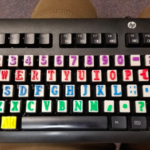Writing With “Handicaps”
We’re using “handicaps” in quotes because things that used to be serious obstacles for writers are becoming less so with technology and helpful, supportive families. See our blog about writing being a family affair here.
Vision
We recently met a successfully published author who has been nearly blind from retinitis pigmentosa since her early 20s. She uses software that turns her speech into text, and turns text to speech, so that she can write and edit her work.
Nuance’s Dragon Naturally Speaking is an example of software that can help vision-impaired users, including speech input, text-to-speech, and OCR. Windows also has free speech-recognition software that can be useful. NVDA is one of several free screen readers that can help people with vision problems use their computers.
Dyslexia
If you have dyslexia, it needn’t hold you back from being a successful writer. One important word-processor feature will help you get your work “ready to go” – the spell check.
Assistive technology has helped seriously dyslexic authors succeed. Again, Dragon Naturally Speaking can help dyslexic authors improve their spelling accuracy and make the process of writing much smoother. WordQ and SpeakQ also helps dyslexic writers get on with their work.
In addition to that, you’ll find support in critique groups, where people can help you to smooth out spelling problems in manuscripts. Closer to home, you might rely on a supportive spouse to review your drafts before you submit them to agents or publishers. We met a couple of authors recently whose husbands are their best editors. One author overcame serious dyslexia to write many novels.
Mobility
You don’t have to go to the post office to submit your heavy manuscript to agents. Many agents prefer the convenience of digital submissions. If you have a computer in your home and an email address, you’re good to go. In addition to being much faster and more cost-effective than the post office, emailing manuscripts allows you to do your bit for the environment.
Age
Age is considered an impairment to pursuing many careers. Not so for authors. You can write into your eighties and beyond. John le Carré, Diana Athill, and Toni Morrison are great examples of writers still going strong in their later years.
If your imagination will let you fly, you can go where you need to go.
As technology continues to advance, obstacles that once held people back from being writers are no longer insurmountable. Whatever your difficulty, keep searching and you can almost always find a solution.
